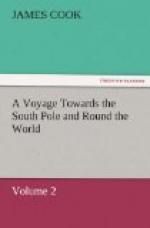I would now inquire of the most conversant in the study of bills of mortality, whether in the most healthful climate, and in the best condition of life, they have ever found so small a number of deaths in such a number of men, within that space of time? How great and agreeable then must our surprise be, after perusing the histories of long navigations in former days, when so many perished by marine diseases, to find the air of the sea acquitted of all malignity, and in fine that a voyage round the world may be undertaken with less danger to health than a common tour in Europe!
But the better to see the contrast between the old and the present times, allow me to recal to your memory what you have read of the first voyage for the establishment of the East-India, Company*. The equipment consisting of four ships, with four hundred and eighty men, three of those vessels were so weakened by the scurvy, by the time they had got only three degrees beyond the Line, that the merchants, who had embarked on this adventure, were obliged to do duty as common sailors; and there died in all, at sea, and on shore at Soldania (a place of refreshment on this side the Cape of Good Hope) one hundred and five men, which was near a fourth part of their complement. And hath not Sir Richard Hawkins, an intelligent as well as brave officer, who lived in that age, recorded, that in twenty years, during which be had used the sea, be could give an account of ten thousand mariners who bad been consumed by the scurvy alone**? Yet so far was this author from mistaking the disease, that I have perused few who have so well described it. If then in those early times, the infancy I may call them of the commerce and naval power of England, so many were carried off by that bane of sea-faring people, what must have been the destruction afterwards, upon the great augmentation of the fleet and the opening of so many new ports to the trade of Great Britain, whilst so little advancement was made in the nautical part of medicine!
[* This squadron under the command of LANCASTER (who was called the General) set out in the year 1601. See Purchas’s Pilgr. vol. i. p. 147, et seq.]
[** Idem, vol. iv. p. 1373, et seq.]
But passing from these old dates to one within the remembrance of many here present, when it might have been expeded that whatever tended to aggrandize the naval power of Britain, and to extend her commerce, would have received the highest improvement; yet we shall find, that even at this late period few measures had been taken to preserve the health of seamen, more than had been known to our uninstructed ancestors. Of this assertion the victorious, but mournful, expedition of Commodore Anson, affords too convincing a proof. It is well known that soon after passing the Streights of Le Maire, the scurvy began to appear in his squadron; that by the time the Centurion had advanced but a little way into the South Sea, forty-seven had died of it




